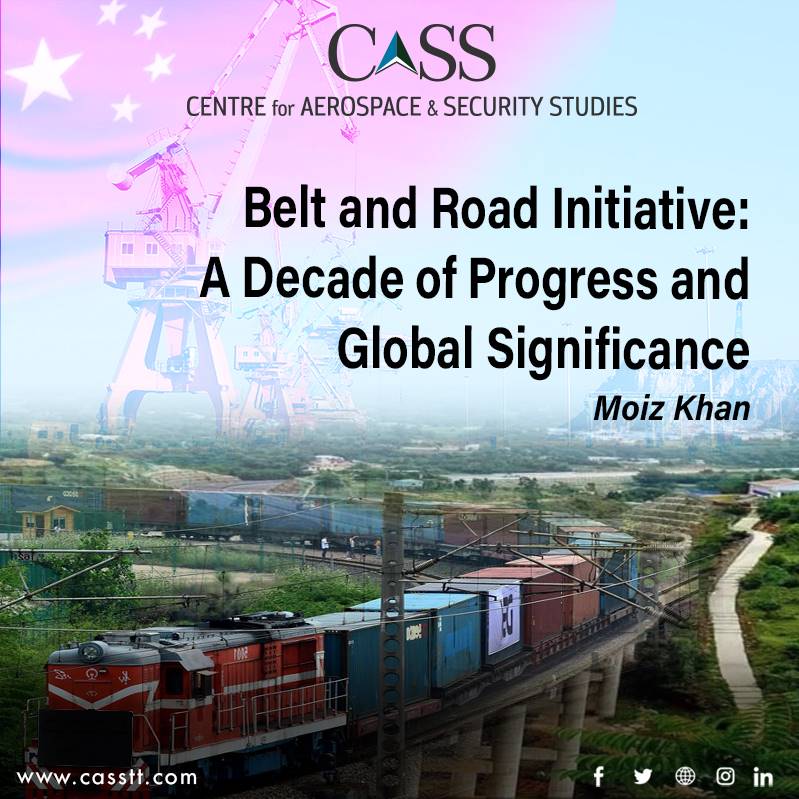The year 2023 marks the 10th anniversary of China’s Belt and Road Initiative (BRI), also known as the ‘One Belt One Road’ (OBOR), or the New Silk Road, launched by Chinese President Xi Jinping in 2013. The BRI has since then continued to evolve from vision into reality, boosting investments in partner countries. China’s recent agreements with the Philippines and Turkmenistan on regional cooperation at the onset of the year 2023 remain a clear manifestation that BRI is not only in line with its strategy of economic cooperation but also continues to bring new development opportunities to the world amid evolving global order. However, the passing decade of the BRI merits brief evaluation concerning its significance, achievements and the hurdles it faced.
China considers opening up to the world as its fundamental policy designed to safeguard its independence and territorial integrity, and also promote world peace and common development. The BRI, being an integral part of the policy, is an expansive venture aimed at fostering economic cooperation and regional connectivity through infrastructure development. Meanwhile, the BRI also incorporates development activities in other sectors, including the promotion of cross-cultural exchange, health and technology etc. Modelled after the ancient Silk Road, which established a conduit between China and other nations, fostering commercial and cultural exchange, the BRI’s primary objective is to construct an extensive network of infrastructure development that includes transportation, energy and mining projects, railways, highways, ports, airports, and pipelines, connecting China to numerous countries in Asia, Europe, and Africa. The BRI helps China in cultivating a more extensive and mutually reliant marketplace, establishing an enabling environment for the development of a sophisticated technological economy and augmenting the country’s economic and political influence.
In this regard, several indicators on the BRI represent a success story. Today, the project is covering two-thirds of the countries and one-third of international organisations in the world. China’s Foreign Direct Investment (FDI) was USD 154 billion in 2020, making the country the largest overseas investor. By May 2022, the aggregate of non-financial direct investment between China and the BRI participant nations exceeded USD 140 billion. Meanwhile, China’s trade in goods with the BRI nations amounted to Yuan 11.6 trillion in 2021, representing a year-on-year increase of 23.6%. The BRI has also been improving livelihoods through poverty reduction programmes and healthcare initiatives, among others in several developing countries.
In terms of projects, two leading projects under the BRI stand out, including the China-Europe express railway and the China-Pakistan Economic Corridor (CPEC). Given the significant emphasis on transport and logistic services, the China-Europe freight train achieved a milestone in 2021 with 15,000 trips – a remarkable increase of 22% from the previous year. The transportation service delivered an impressive volume of goods amounting to 1.46 million TEU containers – reflecting an outstanding growth rate of 29%. This success is credited to its vast network that spans across European cities with 78 operational lines, making it easier for over fifty thousand types of products to be transported efficiently. With this well-established logistics distribution system in place throughout Eurasia, several other infrastructure projects, such as Hungary-Serbia Railway and China-Laos Railway are advancing positively.
CPEC, the USD 50 billion worth flagship project of the BRI, was initiated in 2013. The CPEC framework aims at economically connecting Pakistan not only with China but also with Central Asian Republics (CARs) and the Eurasian region. It includes energy installations, transport infrastructure, the port of Gwadar and the development of industrial cooperation. Though there have been hiccups, both China and Pakistan largely express satisfaction over the completion of projects, and hope that the CPEC would help the latter in strengthening national development and, most importantly, benefiting local people.
Though the aforementioned indicators paint an optimistic image of BRI implementation, it has faced several challenges and risks. There are reports that indicate that 35% of infrastructure projects under BRI confronted significant issues. The initiative has also garnered opposition from some countries who view the loans offered for infrastructure upgrades as a potential burden due to opaque bidding processes and inflated costs. These concerns have resulted in cancelled projects and political backlash. Additionally, non-renewable energy investment has made up nearly half of all BRI spending, leading to climate change concerns.
On the geopolitical front, meanwhile, the US’ strategic competition with China may also have a slowing down impact on the BRI. The Obama administration’s ‘Pivot to Asia’ and the Trump administration’s ‘BUILD Act’ were focused on infrastructure development and cooperation among low-income countries. In 2021, President Joe Biden launched the ‘Build Back Better World Initiative (B3W)’, along with G7 member nations, as a programme for investment in infrastructure aimed at competing against BRI. India is also apprehensive about the BRI. It has been cautioning other countries about China’s so-called geoeconomic ‘tactics’ to create unsustainable debt burdens and seize control of regional choke points. India has been opposed to CPEC as well since it will strengthen Pakistan economically and politically – an outcome that does not align with New Delhi’s interests given their longstanding rivalry. Besides opposition, the US and India continue to disseminate negative media propaganda against the BRI to undermine its significance and acceptance.
Though the aforementioned challenges do suggest potential hurdles for China to sustain and expand the BRI, its smooth sailing over the last decade demonstrates successful implementation of the project. Moreover, Beijing’s efforts to address debt burden concerns of the BRI nations and resolve international debt issues would further build confidence in the initiative and Chinese measures. Long-term success internationally would also rely on Chinese compliance with green development principles, digital infrastructure advancements, and technological innovations. Domestically, China needs to integrate the BRI with inland priorities, particularly the development of Xinjiang and its western region.
Moiz Khan is a Research Assistant at the Centre for Aerospace & Security Studies (CASS), Islamabad, Pakistan. He can be reached at cass.thinkers@casstt.com




